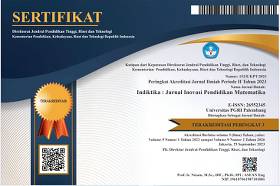KEMAMPUAN PEMAHAMAN KONSEP MATEMATIKA MELALUI MODEL LEARNING CYCLE 5E BERBANTU SIMULASI DIAGRAM VENN
DOI:
https://doi.org/10.31851/indiktika.v1i2.3213Abstract
Tujuan penelitian ini untuk mengetahui pengaruh model pembelajaran Learning Cycle berbantu simulasi diagram venn terhadap kemampuan pemahaman konsep matematika siswa. Metode penelitian ini menggunakan quasi eksperimen. Populasi dalam penelitian ini yaitu seluruh siswa kelas VII SMP Negeri 10 Palembang tahun ajaran 2018/2019. Sampel diambil dengan menggunakan teknik Simple Random Sampling, sebanyak 32 siswa kelas eksperimen dan 32 siswa kelas kontrol. Penelitian dilaksanakan di SMP Negeri 10 Palembang, yang terletak di Kecamatan Kemuning Kota Palembang Sumatera Selatan. Sedangkan waktu penelitiannya antara bulan Oktober hingga bulan November tahun 2018. Pengujian hipotesis menggunakan Uji-t Independent Sample. Penelitian membuktikan bahwa ada pengaruh positif model pembelajaran Learning Cycle berbantu simulasi diagram venn terhadap kemampuan pemahaman konsep matematika.
 Kata kunci : model Learning Cycle 5E, kemampuan pemahaman konsep matematika
Â
Â
ABSTRACT
The purpose of this study was to determine the effect of the Learning Cycle learning model assisted by a simulation of a venn diagram on the ability to understand students' mathematical concepts. This research method uses quasi experiment. The population in this study were all VII grade students of SMP Negeri 10 Palembang in the 2018/2019 school year. Samples were taken using Simple Random Sampling technique, as many as 32 experimental class students and 32 control class students. The study was carried out at Palembang Public Middle School 10 Palembang, which is located in Kemuning District, Palembang City, South Sumatra. While the time of his research is between October and November 2018. Hypothesis testing uses the Independent Sample t-test. Research shows that there is a positive influence on the Learning Cycle learning model assisted in the simulation of a diagram of a venn on the ability to understand mathematical concepts.
Â
Keywords : Learning Cycle 5E model, the ability to understand mathematical concepts
References
Ahmad, Shufiana. 2015. Efektivitas Model Pembelajaran Learning Cycle 5E Berbantu Alat Peraga Pada Materi Segitiga Kelas VII Terhadap Kemampuan Pemecahan Masalah Siswa. Delta, Vol. 3(1) : 63-74.
Antika, Yuli. 2016. Pengaruh Model Pembelajaran Learning Cycle Terhadap Kemampuan Pemahaman Konsep Matematika Pada Siswa SMP Negeri 44 Palembang. Skripsi tidak dipublikasikan. Palembang: Universitas PGRI Palembang.
Handayani, S. D. 2011. Pengembangan Perangkat Pembelajaran Matematika dengan Model Learning Cycle-5E Pada Pokok Bahasan Kesebangunan Kelas IX SMP Negeri Benjeng. [Online]. Tersedia: http://digilib.uinsby.ac.id/9342 [28 Februari 2018].
Kesumawati, Nila. 2010. Peningkatan Kemampuan Pemahaman Konsep, Pemecahan Masalah, dan Disposisi Matematika Siswa SMP Melalui Pendekatan Pendidikan Matematis Realistik. Disertasi tidak dipublikasikan. Bandung: Universitas Pendidikan Indonesia.
Ngalimun. 2017. Strategi dan Model Pembelajaran. Yogyakarta: Dua Satria Offet.
Peraturan Menteri Pendidikan Nasional RI No 22 Tahun 2006.
Shoimin, Aris. 2014. Model Pembelajaran Inovatif dalam Kurikulum 2013.Yogyakarta: Ar-Ruzz Media.
Sudjana, Nana. 2014. Dasar-dasar Proses Belajar-mengajar. Bandung: Sinar Baru Algensindo.
Tampubolon, Priska Damayanti. 2016. Penerapan Model Learning Cycle Untuk Meningkatkan Kemampuan Pemahaman Konsep Matematika Siswa di SMA Negeri 1 Palembang. Skripsi tidak dipublikasikan. Palembang: Universitas PGRI Palembang.
Wena, Made. 2014. Strategi Pembelajaran Inovatif Kontemporer. Jakarta: Bumi Aksara.
Downloads
Published
Issue
Section
License
This work is licensed under a Creative Commons Attribution-ShareAlike 4.0 International License.
Authors who publish with this journal agree to the following terms:
- Authors retain copyright and grant the journal right of first publication with the work simultaneously licensed under a Creative Commons Attribution License that allows others to share the work with an acknowledgement of the work's authorship and initial publication in this journal.
- Authors are able to enter into separate, additional contractual arrangements for the non-exclusive distribution of the journal's published version of the work (e.g., post it to an institutional repository or publish it in a book), with an acknowledgement of its initial publication in this journal.
- Authors are permitted and encouraged to post their work online (e.g., in institutional repositories or on their website) prior to and during the submission process, as it can lead to productive exchanges, as well as earlier and greater citation of published work.













